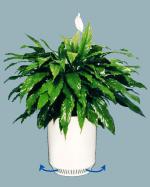Search engine visitors - click here to access entire "$ensible Home" web site
Click here to see a descriptive illustration showing a natural air cleaner planter and a hydroponic kit.
Dear Jim: I want cleaner indoor air for my family, but I hate to run noisy room air cleaners that use electricity. I prefer a more natural way. Will growing specific houseplants help and will hydroponics work best? - Jen G.

A: There are a couple of dozen varieties of houseplants that are effective for removing specific chemical pollutants from the air naturally. With all the synthetic materials, cleaners, chemicals, electronics, etc. we now use in our homes, indoor air is often more polluted than outdoor air.
Quite a few years ago, NASA did studies on how plants could be used to remove dangerous chemicals for the air inside spacecraft. Much of the current information and selected plants are still based on these studies.
You probably should still use a HEPA room air cleaner at times to remove fine particles from the air. The plants remove (actually convert to harmless compounds) only chemicals, not particles that can also trigger allergic reactions and problems. On low speed, they are quiet and energy efficient.
The plant leaves absorb and convert some of the chemicals, but the roots and soil (or growing media) are also effective chemical neutralizers. The microbes in the soil and the roots consume bad chemicals as a food source. For this to be most effective, the soil should be loose for room air to migrate through it.
There are attractive planters available that have a tiny air circulation fan in the base. Inside the planter is an air inlet manifold ring sandwiched between layers of charcoal filtering media and expanded clay soil. This allows the air to circulate throughout the soil and roots.
Instead of having your room air tested for chemical pollutants, just grow a combination of selected purifying houseplants. Some common ones that are easy to grow are spider plants, English ivy, schefflera, and peace lily. Also select a few orchids and bromeliads that are most effective at night.
As you mentioned, hydroponics is an excellent method to grow healthy house plants, as well as plants for food (tomatoes, lettuce, peppers, etc.). Instead of using standard soil, the plants thrive in loose growing media. All you add is water and special fertilizer for hydroponic plantings.
There are many hydroponic planter kits available from beginner kits for homes or offices to large systems. Most of them include a small built-in water circulation pump, soil and a container to set it up quickly.
If your problem rooms do not have enough natural light from windows for plants so that you need artificial lighting, choose efficient low-sodium lights. These are particularly good for growing fruiting and flowering plants.
Instant Download Update Bulletin No. 586 - list of purifier planters, 20 most effective houseplants for specific pollutants and a growing guide, tips for healthy houseplants, general information on hydroponics, description of different hydroponic systems and kits, list of manufacturers and suppliers of hydroponic kits and supplies, do-it-yourself instructions for building a simple hydroponic unit.
Dear Jim: One of my bathroom faucets has very low hot water pressure, but the rest of them are fine. I have heard about inserting a dime in the faucet to fix it. Can you explain how to do this? - Roger C.
A: First, turn off the cold water supply valve to the water heater. Unscrew the aerator from the faucet, put a dime in it and screw it back on.
Open the hot water faucet in another bathroom. Open the hot and cold water faucet handles at the problem sink. This will blast cold water back into the hot water line and hopefully dislodge the deposits. Close all the faucets, remove the dime and reopen the cold water valve to the water heater.